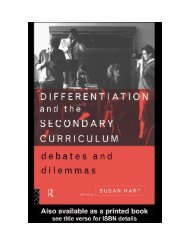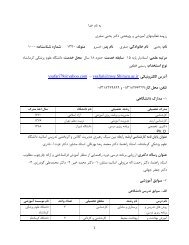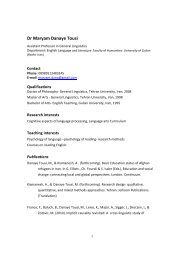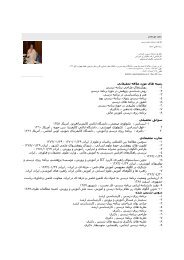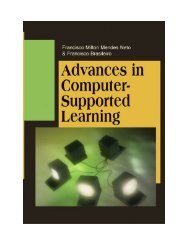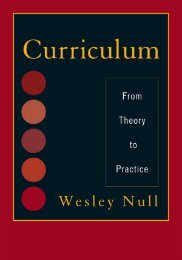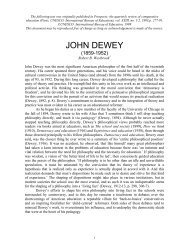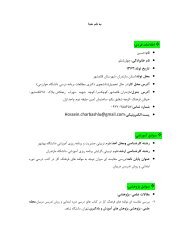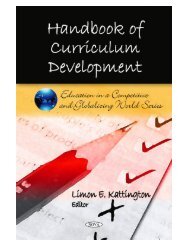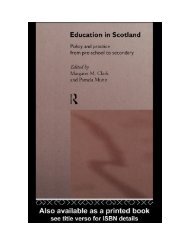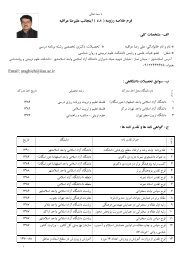The Reconceptualisation of Curriculum Studies
The Reconceptualisation of Curriculum Studies
The Reconceptualisation of Curriculum Studies
Create successful ePaper yourself
Turn your PDF publications into a flip-book with our unique Google optimized e-Paper software.
This article was downloaded by: [University <strong>of</strong> Gothenburg]<br />
On: 14 September 2011, At: 05:06<br />
Publisher: Routledge<br />
Informa Ltd Registered in England and Wales Registered Number: 1072954<br />
Registered <strong>of</strong>fice: Mortimer House, 37-41 Mortimer Street, London W1T 3JH, UK<br />
Journal <strong>of</strong> <strong>Curriculum</strong> <strong>Studies</strong><br />
Publication details, including instructions for authors and<br />
subscription information:<br />
http://www.tandfonline.com/loi/tcus20<br />
<strong>The</strong> <strong>Reconceptualisation</strong> <strong>of</strong><br />
<strong>Curriculum</strong> <strong>Studies</strong><br />
William F. Pinar a<br />
a University <strong>of</strong> Rochester<br />
Available online: 29 Sep 2006<br />
To cite this article: William F. Pinar (1978): <strong>The</strong> <strong>Reconceptualisation</strong> <strong>of</strong> <strong>Curriculum</strong> <strong>Studies</strong>,<br />
Journal <strong>of</strong> <strong>Curriculum</strong> <strong>Studies</strong>, 10:3, 205-214<br />
To link to this article: http://dx.doi.org/10.1080/0022027780100303<br />
PLEASE SCROLL DOWN FOR ARTICLE<br />
Full terms and conditions <strong>of</strong> use: http://www.tandfonline.com/page/terms-andconditions<br />
This article may be used for research, teaching and private study purposes. Any<br />
substantial or systematic reproduction, re-distribution, re-selling, loan, sub-licensing,<br />
systematic supply or distribution in any form to anyone is expressly forbidden.<br />
<strong>The</strong> publisher does not give any warranty express or implied or make any<br />
representation that the contents will be complete or accurate or up to date. <strong>The</strong><br />
accuracy <strong>of</strong> any instructions, formulae and drug doses should be independently<br />
verified with primary sources. <strong>The</strong> publisher shall not be liable for any loss, actions,<br />
claims, proceedings, demand or costs or damages whatsoever or howsoever caused<br />
arising directly or indirectly in connection with or arising out <strong>of</strong> the use <strong>of</strong> this<br />
material.
<strong>The</strong> <strong>Reconceptualisation</strong> <strong>of</strong> <strong>Curriculum</strong> <strong>Studies</strong><br />
Downloaded by [University <strong>of</strong> Gothenburg] at 05:06 14 September 2011<br />
William F. Pinar<br />
University <strong>of</strong> Rochester<br />
What some observers have designated a 'movement' is visible in the field <strong>of</strong><br />
curriculum studies in the United States. Some have termed it 'reconceptualism',<br />
others 'the new curriculum theory'. Both terms suggest more thematic unity<br />
among the curriculum writing characterized as the 'reconceptualization' than,<br />
upon close examination, appears to exist. Nonetheless, some thematic similarities<br />
are discernible, though insufficient in number to warrant a characterization<br />
like 'ideology' or composite, agreed-upon point <strong>of</strong> view. What can be said, without<br />
dispute, is that by the summer <strong>of</strong> 1978, there will have been six conferences and<br />
five books 1 in the past six years which are indications <strong>of</strong> a socio-intellectual<br />
phenomenon in this field, and a phenomenon which clearly functions to reconceptualize<br />
the field <strong>of</strong> curriculum studies. Thus, while the writing published<br />
to date may be somewhat varied thematically, it is unitary in its significance<br />
for the field. If this process <strong>of</strong> transformation continues at its present rate,<br />
the field <strong>of</strong> curriculum studies will be pr<strong>of</strong>oundly different in 20 years time than<br />
it has been during the first 50 years <strong>of</strong> its existence.<br />
What is this reconceptualization? <strong>The</strong> answer, at this point, is a slippery<br />
one, and to gain even an inchoate grip, one looks to the field as it is. This will<br />
indicate, in part, what is not. To a considerable extent, the reconceptualization<br />
is a reaction to what the field has been, and what it is seen to be at the present<br />
time.<br />
Traditionalists<br />
Most curricularists at work in 1977 can be characterized as traditionalists.<br />
<strong>The</strong>ir work continues to make use <strong>of</strong> the 'conventional wisdom' <strong>of</strong> the field,<br />
epitomized still by the work <strong>of</strong> Tyler. More important in identifying traditionalists<br />
than the allusion to Tyler is citing the raison d'être for traditional curriculum<br />
work. Above all, the reason for curriculum writing, indeed curriculum work<br />
generally, is captured in the phrase 'service to practitioners'. <strong>Curriculum</strong> work<br />
tends to be field-based and curriculum writing tends to have school teachers in
2Ub JOURNAL OF CURRICULUM STUDIES W.i<br />
Downloaded by [University <strong>of</strong> Gothenburg] at 05:06 14 September 2011<br />
mind. In short, traditional curriculum work is focused on the schools. Further,<br />
pr<strong>of</strong>essors <strong>of</strong> curriculum have tended to be former school people. In fact, school<br />
service <strong>of</strong> some sort, ordinarily classroom teaching, is still viewed as a prerequisite<br />
for a teaching post in the field in a college or university. To an extent<br />
not obvious in certain <strong>of</strong> the other subfields <strong>of</strong> eduction (for instance, philosophy<br />
and psychology <strong>of</strong> education, recently in administration and the 'helping services'),<br />
curricularists are former school people whose intellectual and subcultural<br />
ties tend to be with school practitioners. <strong>The</strong>y tend to be less interested in basic<br />
research, in theory development, in related developments in allied fields, than in<br />
a set <strong>of</strong> perceived realities <strong>of</strong> classrooms and school settings generally.<br />
<strong>The</strong>re is, <strong>of</strong> course, an historical basis for traditional curriculum work.<br />
Cremin suggests that it was after superintendent Newlon's work in curriculum<br />
revision, in the early 1920s in Denver, that the need for a curriculum specialist<br />
became clear. 2 It is plausible to imagine school administrators like Newlon<br />
asking teachers who demonstrated an interest in curriculum and its development<br />
to leave classroom teaching and enter an administrative <strong>of</strong>fice from which they<br />
would attend full-time to matters curricular. <strong>The</strong>re were no departments <strong>of</strong><br />
curriculum in colleges <strong>of</strong> education in the 1920s; Newlon and other administrators<br />
could go nowhere else but to the classroom for curriculum personnel.<br />
When the training <strong>of</strong> curriculum personnel began at the university level in the<br />
1930s, it surfaced in departments <strong>of</strong> administration and secondary education,<br />
indicating further the field's origin in and loyalty to the practical concerns <strong>of</strong><br />
school personnel. This affiliation, more tenuous and complex at the present<br />
time than it was in the 1920s and 1930s, is evident in the programmes <strong>of</strong> the<br />
largest pr<strong>of</strong>essional association <strong>of</strong> curricularists in the United States, the Association<br />
for Supervision and <strong>Curriculum</strong> Development. <strong>The</strong> programmes <strong>of</strong><br />
ASCD annual meetings indicate a considerable and growing presence <strong>of</strong> school<br />
personnel. Further, the workshops and papers listed, the authors <strong>of</strong> which are<br />
university teachers, tend to have an explicit thematic focus on whatever school<br />
concerns are au courant.<br />
<strong>The</strong>re is another sense in which traditionalists carry forward the tradition<br />
<strong>of</strong> the field. <strong>The</strong> curriculum field's birth in the 1920s was understandably shaped<br />
by the intellectual character <strong>of</strong> that period. Above all it was a time <strong>of</strong> an emerging<br />
scientism when so-called scientific techniques from business and industry were<br />
finding their way into educational theory and practice. <strong>The</strong> early curricularist<br />
came to employ what Kliebard has termed the 'bureaucratic model'. 3 This<br />
model is characterized by its ameliorative orientation, ahistorical posture, and<br />
an allegiance to behaviourism and to what Macdonald has termed a 'technological<br />
rationality'. <strong>The</strong> curriculum worker is dedicated to the 'improvement' <strong>of</strong> schools.<br />
He honours this dedication by accepting the curriculum structure as it is.<br />
'<strong>Curriculum</strong> change' is measured by comparing resulting behaviours with<br />
original objectives. Even humanistic educators tend to accept many <strong>of</strong> these<br />
premises, as they introduce, perhaps, 'values clarification' into the school<br />
curriculum. Accepting the curriculum structure as it is, and working to improve<br />
it, is what is meant by the 'technician's mentality'. In a capsule way, it can be<br />
likened to adjusting an automobile engine part in order to make it function more<br />
effectively. This is also technological rationality, and its manifestations in school<br />
practice run the gamut from 'competency-based teacher education' to 'modular<br />
scheduling'. <strong>The</strong> emphasis is on design, change (behaviourally observable), and
RECONCEPTUALIZATION OF CURRICULUM STUDIES 207<br />
Downloaded by [University <strong>of</strong> Gothenburg] at 05:06 14 September 2011<br />
improvement.<br />
What has tended to be regarded as curriculum theory in the traditional<br />
sense, most notably Tyler's rationale, 4 is theoretical only in the questionable<br />
sense that it is abstract and usually at variance with what occurs in schools.<br />
Its intent is clearly to guide, to be <strong>of</strong> assistance to those in institutional positions<br />
who are concerned with curriculum. Of course, this is a broad concern. Most<br />
teachers share it, at least in terms <strong>of</strong> daily lesson planning. But as well as an<br />
element <strong>of</strong> teaching, curriculum is traditionally thought to include considerations<br />
such as evaluation, supervision, and also curriculum development and implementation.<br />
<strong>The</strong> boundaries <strong>of</strong> the field are fuzzy.<br />
<strong>The</strong>matically there is no unity. From Tyler to Taba and Saylor and<br />
Alexander to the current expression <strong>of</strong> this genre in Daniel and Laurel Tanner's<br />
book, Neil's and Zais' writing (all <strong>of</strong> which attempt an overview <strong>of</strong> considerations<br />
imagined pertinent to a curriculum worker) to the humanistic movement,<br />
(for instance the work <strong>of</strong> such individuals as Fantini, Jordan, Simon, Weinstein)<br />
is a broad thematic territory. 5 What makes this work one territory is its fundamental<br />
interest in working with school people, with revising the curricula <strong>of</strong><br />
schools. Traditional writing tends to be journalistic, necessarily so, in order that<br />
it can be readily accessible to a readership seeking quick answers to pressing,<br />
practical problems. <strong>The</strong> publications <strong>of</strong> the Association for Supervision and<br />
<strong>Curriculum</strong> Development also exemplify, to a considerable extent, this writing.<br />
ASCD is the traditionalists' pr<strong>of</strong>essional organization. Relatively speaking, there<br />
exists a close relationship between traditional curricularists and school personnel.<br />
Conceptual-empiricists<br />
A relationship between school personnel and the other two groups <strong>of</strong> curricularists—conceptual-empiricists<br />
and reconceptualists—also exists. But the nature<br />
<strong>of</strong> this relationship differs from the alliance historically characteristic <strong>of</strong> the<br />
field. This difference becomes clearer as we examine, momentarily, a second<br />
group <strong>of</strong> curricularists, a group which, until reconceptualists appeared, seemed<br />
to be the only heir to the field.<br />
I use the word heir advisedly, for the traditional curriculum field has been<br />
declared terminally ill or already deceased by several influential observers,<br />
among them Schwab and Huebner. 6 What has caused, in the past 15 to<br />
20 years, the demise <strong>of</strong> the field? A comprehensive answer to this important<br />
question is inappropriate in the present context. What can be pointed to is<br />
two-fold. First, the leadership <strong>of</strong> the so-called curriculum reform movement<br />
<strong>of</strong> the 1960s was outside the field. This bypass was a crippling blow to its pr<strong>of</strong>essional<br />
status. If those whose work was curriculum development and implementation<br />
were called on primarily as consultants and only rarely at that, then<br />
clearly their claim to specialized knowledge and expertise was questionable.<br />
Second, the economic situation <strong>of</strong> the past six years has meant a drying up <strong>of</strong><br />
funds for in-service work and for curriculum proposals generally. A field whose<br />
pr<strong>of</strong>essional status was irreparably damaged now lost the material basis necessary<br />
for its functioning. How could curricularists work with school people without<br />
money or time for in-service workshops? How could curriculum proposals be
208 JOURNAL OF CURRICULUM STUDIES 10:3<br />
Downloaded by [University <strong>of</strong> Gothenburg] at 05:06 14 September 2011<br />
implemented without requisite funds?<br />
With the traditional, practical justification <strong>of</strong> the field attenuated—even<br />
teacher-training efforts have slowed dramatically—new justifications appeared.<br />
<strong>Curriculum</strong> and other education subfields have become increasingly vulnerable<br />
to criticisms regarding scholarly standards by colleagues in so-called cognate<br />
fields. Particularly the influence <strong>of</strong> colleagues in the social sciences is evident,<br />
parallelling the political ascendency <strong>of</strong> these disciplines in the university generally.<br />
In fact, research in education, in many instances, has become indistinguishable<br />
from social science research. <strong>The</strong> appearance and proliferation <strong>of</strong> conceptualempiricists<br />
in the curriculum field is a specific instance <strong>of</strong> this general phenomenon.<br />
<strong>The</strong>re remains, <strong>of</strong> course, the notion that research has implications for<br />
classroom practice, but it is usually claimed that many years <strong>of</strong> extensive research<br />
are necessary before significant implications can be obtained.<br />
This development has gone so far that, examining the work done by a<br />
faculty in a typical American college <strong>of</strong> education, one has little sense <strong>of</strong> education<br />
as a field with its own identity. One discovers researchers whose primary identity<br />
is with the cognate field. Such individuals view themselves as primarily psychologists,<br />
philosophers, or sociologists with ' research interests ' in schools and<br />
education-related matters. By 1978, it is accurate to note that the education<br />
field has lost whatever (and it was never complete <strong>of</strong> course) intellectual autonomy<br />
it possessed in earlier years, and now is nearly tantamount to a colony <strong>of</strong> superior,<br />
imperialistic powers.<br />
<strong>The</strong> view that education is not a discipline in itself but an area to be studied<br />
by the disciplines is evident in the work <strong>of</strong> those <strong>of</strong> curricularists I have called<br />
conceptual-empiricists. <strong>The</strong> work <strong>of</strong> this group can be so characterized, employing<br />
conceptual and empirical in the sense social scientists typically employ<br />
them. This work is concerned with developing hypotheses to be tested, and<br />
testing them in methodological ways characteristic <strong>of</strong> mainstream social science.<br />
This work is reported, ordinarily, at meetings <strong>of</strong> the American Educational<br />
Research Association. Just as the Association for Supervision and <strong>Curriculum</strong><br />
Development is the traditionalists' organization, AERA tends to be the organization<br />
<strong>of</strong> conceptual-empiricists. (In relatively small numbers traditionalists<br />
and reconceptualists also read papers at AERA annual meetings.)<br />
An illustrative piece <strong>of</strong> conceptual work from this second group <strong>of</strong> curricularists<br />
was published in the AERA-sponsored Review <strong>of</strong> Educational Research.<br />
It is George Posner's (with Kenneth Strike) 'A categorization scheme for<br />
principles <strong>of</strong> sequencing content'. A prefatory paragraph indicates that his view<br />
is a social scientist's one, reliant upon hypothesis-making, data collection, and<br />
interpretation.<br />
We have very little information, based on hard data, regarding the<br />
consequences <strong>of</strong> alternative content sequences and will need a good<br />
deal more research effort before we are able to satisfactorily suggest<br />
how content should be sequenced. Our intention here is to consider<br />
the question, What are the alternatives? 7<br />
<strong>The</strong> article is a conceptual one, concerned with what the authors view as logically<br />
defensible content sequencing alternatives, and it is empirical in its allegiance<br />
to the view <strong>of</strong> empirical research, one yielding 'hard data', typical <strong>of</strong> social<br />
science at the present time.
RECONCEPTUALIZATION OF CURRICULUM STUDIES 209<br />
Downloaded by [University <strong>of</strong> Gothenburg] at 05:06 14 September 2011<br />
In a recently published essay, Decker F. Walker, another visible conceptualempiricist,<br />
moves away somewhat from strict social science as exemplified in<br />
Posner's work. 8 His essay, or case study as he terms it, is more anthropological<br />
in its methodological form, demonstrating a type <strong>of</strong> curriculum research which<br />
Walker's co-editor Reid endorses. 9 Anthropology, it should be noted, while<br />
regarded as not as ' pure' a social science as political science or psychology, is<br />
nonetheless generally categorized as a social science.<br />
Taking his cue from Schwab, Walker argues that prescriptive curriculum<br />
theories, (partly because they do not reflect the actual process <strong>of</strong> curriculum<br />
change) are not useful. Rather than focus on why curriculum developers did<br />
not follow the Tyler rationale, Walker concentrates on how, in fact, the developers<br />
did proceed. In his study he finds little use for terms like objectives and important<br />
use for terms such as platform and deliberation. He concludes that curricularists<br />
probably ought to abandon the attempt to make actual curriculum development<br />
mirror prescriptive theories, accept 'deliberation' as a core aspect <strong>of</strong> the development<br />
process, and apply the intellectual resources <strong>of</strong> the field toward improving<br />
the quality <strong>of</strong> deliberation and employing it more effectively.<br />
This work I find significant to the field in two ways. First it deals another<br />
hard blow to the Tyler rationale and its influence. Second, Walker is moving<br />
away from social science. His work remains social science, but it is closer to the<br />
work <strong>of</strong> some reconceptualists than it is to that <strong>of</strong> Posner, and other mainstream<br />
conceptual-empiricists. Walker retains the traditional focus upon the practical<br />
concerns <strong>of</strong> school people and school curriculum, and no doubt he has and will<br />
spend a portion <strong>of</strong> his pr<strong>of</strong>essional time on actual curriculum projects. Further,<br />
his methods seem more nearly those <strong>of</strong> the ethnomethodologist whose approaches<br />
do not easily fit the picture <strong>of</strong> conventional theories <strong>of</strong> the middle range, as<br />
projected by individuals such as the sociologist Robert Merton, who has influenced<br />
so many conceptual-empirical studies in the field <strong>of</strong> sociology. Walker appears<br />
to be moving outside mainstream conceptual-empiricism.<br />
Also in the Reid and Walker book is work by another visible conceptualempiricist,<br />
Ian Westbury. With his co-author Lynn McKinney, Westbury<br />
studies the Gary, Indiana school system during the period 1940-1970. 10<br />
Like Walker's study <strong>of</strong> the art project, McKinney and Westbury's study would<br />
seem to be outside mainstream conceptual-empiricism, even close to work<br />
characteristic <strong>of</strong> the humanities. <strong>The</strong> structure <strong>of</strong> the study, however, indicates<br />
its allegiance to social science, thus warranting its categorization as conceptualempirical.<br />
<strong>The</strong> work is a historical study done in the service <strong>of</strong> generalization,<br />
work that has interest in the particular (the Gary district) as it contributes to<br />
understanding <strong>of</strong> the general. <strong>The</strong> 'general' in this instance is the phenomenon<br />
<strong>of</strong> stability and change, which the authors 'now believe are the two primary<br />
functions <strong>of</strong> the administrative structure which surround the schools'. 11 Finally<br />
what the study demonstrates is 'that a concern for goals without a concomitant<br />
concern for organizational matters addresses only a small part <strong>of</strong> the problem<br />
<strong>of</strong> conceiving new. designs for schools'. 12 This use <strong>of</strong> the specific to illustrate a<br />
general, ahistorical 'law' is, <strong>of</strong> course, a fundamental procedure <strong>of</strong> mainstream<br />
social science.<br />
Reconceptualists<br />
This concern for generalization is not abandoned in the work <strong>of</strong> the third group
210 JOURNAL OF CURRICULUM STUDIES 10:3<br />
Downloaded by [University <strong>of</strong> Gothenburg] at 05:06 14 September 2011<br />
<strong>of</strong> curricularists, the reconceptualists. For example, at the fourth conference at<br />
the University <strong>of</strong> Wisconsin-Milwaukee, Pr<strong>of</strong>essor Apple reported the results<br />
<strong>of</strong> a study he and a colleague conducted in a kindergarten, substantiating claims he<br />
has made before regarding the socio-political functions <strong>of</strong> classroom behaviour. 13<br />
His case study is distinguishable from the work <strong>of</strong> a typical conceptual-empiricist<br />
in two significant respects: (1) his acknowledged 'value-laden' perspective,<br />
and (2) a perspective with a politically emancipatory intent. That is, in<br />
contrast to the canon <strong>of</strong> traditional social science, which prescribes data<br />
collection, hypothesis substantiation or disconfirmation in the disinterested<br />
service <strong>of</strong> building a body <strong>of</strong> knowledge, a reconceptualist tends to see research<br />
as an inescapably political as well as intellectual act. As such, it works to suppress,<br />
or to liberate, not only those who conduct the research, and those upon whom it is<br />
conducted, but as well those outside the academic subculture. Mainstream<br />
social science research, while on the surface seemingly apolitical in nature and<br />
consequence, if examined more carefully can be seen as contributing to the<br />
maintenance <strong>of</strong> the contemporary social-political order, or contributing to its<br />
dissolution. Apple and Marxists and neo-Marxists go further and accept a<br />
teleological view <strong>of</strong> historical movement, allying themselves with the lower<br />
classes, whose final emergence from oppression is seen to be inevitable. A<br />
number <strong>of</strong> reconceptualists, while not Marxists, nonetheless accept some variation<br />
<strong>of</strong> this teleological historical view. And many <strong>of</strong> these, at least from a distance,<br />
would seem to be 'leftists' <strong>of</strong> some sort. Nearly all accept that a political dimension<br />
is inherent in any intellectual activity.<br />
This political emphasis distinguishes the work <strong>of</strong> Apple, Burton, Mann,<br />
Molnar, some <strong>of</strong> the work <strong>of</strong> Huebner and Macdonald, from the work <strong>of</strong><br />
traditionalists and conceptual-empiricists. 14 It is true that Reid and Walker<br />
in their Case <strong>Studies</strong> in <strong>Curriculum</strong> Change acknowledge that curriculum development<br />
is political, but the point is never developed, and never connected with a<br />
view <strong>of</strong> history and the contemporary social order. <strong>The</strong> focus <strong>of</strong> Walker's case<br />
study and <strong>of</strong> other case studies in the book is limited to literal curriculum change,<br />
without historicizing this change, indicating its relationship to contemporary<br />
historical movement generally. In the 1975 ASCD year-book, on the other<br />
hand, which is edited by Macdonald and Zaret, with essays also by Apple,<br />
Burton, Huebner, and Mann, this siting <strong>of</strong> curriculum issues in the broad<br />
intellectual-historical currents <strong>of</strong> twentieth-century life is constant. 15 Macdonald<br />
speaks, for instance, <strong>of</strong> technological rationality, an intellectual mode comparable<br />
in its pervasiveness and taken-for-grantedness to the ascendency <strong>of</strong> technology<br />
in human culture at large. 16 Such individuals would argue that comprehension<br />
<strong>of</strong> curriculum issues is possible only when they are situated historically.<br />
<strong>The</strong> 1975 ASCD year-book speaks to school people. It is not that reconceptualists<br />
do not speak to this constituency <strong>of</strong> the curriculum field. But there<br />
is a conscious abandonment <strong>of</strong> the 'technician's mentality'. <strong>The</strong>re are no prescriptions<br />
or traditional rationales. What this vear-book <strong>of</strong>fers, instead, is heiVhtened<br />
awareness <strong>of</strong> the complexity and historical significance <strong>of</strong> curriculum issues.<br />
Because the difficulties these reconceptualists identify are related to difficulties<br />
in the culture at large, they are not 'problems' that can be 'solved'. That concept<br />
created by technological rationality, is itself problematic. Thus, what is necessary,<br />
in part, is fundamental structural change in the culture. Such an aspiration<br />
cannot be realized by 'plugging into' the extant order. That is why an elective
RECONCEPTUALIZATION OF CURRICULUM STUDIES 211<br />
Downloaded by [University <strong>of</strong> Gothenburg] at 05:06 14 September 2011<br />
or two on Marx in high-school social studies classes, or the teaching <strong>of</strong> autobiographical<br />
reflection in English classes bring indifference and <strong>of</strong>ten alarm<br />
to most reconceptualists. That 'plugging into', 'co-opting' it was termed in the<br />
1960s during the student protests, accepts the social order as it is. What is<br />
necessary is a fundamental reconceptualization <strong>of</strong> what curriculum is, how it<br />
functions, and how it might function in emancipatory ways. It is this commitment<br />
to a comprehensive critique and theory development that distinguishes the<br />
reconceptualist phenomenon.<br />
To understand more fully the efforts <strong>of</strong> the individuals involved in inquiry<br />
<strong>of</strong> this kind requires some understanding <strong>of</strong> metatheory and philosophy <strong>of</strong><br />
science. Without such grounding, it is difficult, if not impossible, for curricularists<br />
to see clearly their work in the context <strong>of</strong> the growth <strong>of</strong> knowledge<br />
in general. Max van Manen's paper at the 1976 Wisconsin conference was a<br />
significant effort to analyse various structures <strong>of</strong> theoretic knowledge as they<br />
related to dominant modes <strong>of</strong> inquiry in the field <strong>of</strong> curriculum. 17 His work<br />
builds on basic analyses undertaken by philosophers <strong>of</strong> science such as Radnitzky<br />
and Feyerabend. 18 More work needs to be done along this line.<br />
<strong>The</strong> reconceptualization, it must be noted, is fundamentally an intellectual<br />
phenomenon, not an interpersonal-affiliative one. Reconceptualists have no<br />
organized group, such as ASCD or AERA. Individuals at work, while sharing<br />
certain themes and motives, do not tend to share any common interpersonal<br />
affiliation. (In this one respect their work parallels that <strong>of</strong> the so-called romantic<br />
critics <strong>of</strong> the 1960s. But here any such comparison stops.) Conferences have been<br />
held yearly; the most recent on the campus <strong>of</strong> Rochester Institute <strong>of</strong> Technology,<br />
Rochester, New York. A journal and a press emphasizing this work are scheduled<br />
to appear by 1979.<br />
Conclusion<br />
As an interpreter <strong>of</strong> metatheories, Richard Bernstein recently analysed, in detail,<br />
individuals at work in four areas—empirical research, philosophical analysis,<br />
phenomenology and critical theory <strong>of</strong> society. 19 (<strong>The</strong> first category corresponds<br />
to conceptual-empirical, the third and fourth to reconceptualist work.) He ends<br />
his study with this conviction:<br />
In the final analysis we are not confronted with exclusive choices:<br />
either empirical or interpretative theory or critical theory.<br />
Rather there is an internal dialectic in the restructing <strong>of</strong> social<br />
political theory: when we work through any one <strong>of</strong> these movements<br />
we discover the others are implicated. 20<br />
This is so in the field <strong>of</strong> curriculum studies also. We are not faced with an<br />
exclusive choice: either the traditional wisdom <strong>of</strong> the field, or conceptualempiricism,<br />
or the reconceptualization. Each is reliant upon the other.<br />
For the field to become vital and significant to American education it must<br />
nurture each 'moment', its 'internal dialectic'. And it must strive for synthesis,<br />
for a series <strong>of</strong> perspectives on curriculum that are at once empirical, interpretative,<br />
critical, emancipatory.<br />
But such nurturance and synthesis do not characterize, on the whole,<br />
the field today. Some <strong>of</strong> the issues raised by the British sociologist David<br />
C.S.<br />
Q
212 JOURNAL OF CURRICULUM STUDIES 10:3<br />
Downloaded by [University <strong>of</strong> Gothenburg] at 05:06 14 September 2011<br />
Silverman are germane here. 21 As a prologue to more adequate social science<br />
theorizing, Silverman proposes that we learn how to read Castaneda's account<br />
<strong>of</strong> his apprenticeship to Don Juan in order that we may come to know the kinds<br />
<strong>of</strong> questions that need to be asked. He is convinced that mainstream conceptualempiricists,<br />
regardless <strong>of</strong> field, do not now know what questions to ask, and are,<br />
indeed, intolerant <strong>of</strong> reconceptualizations that differ from their own. Th's<br />
intolerance is discernible in the American curriculum field. To some extent it<br />
can be found in each group <strong>of</strong> curricularists.<br />
I am convinced that this intolerance among curricularists for work differing<br />
from one's own must be suspended to some extent if significant intellectual<br />
movement in the field is to occur. Becoming open to another genre <strong>of</strong> work does<br />
not mean loss <strong>of</strong> one's capacity for critical reflection. Nor does it mean, necessarily,<br />
loss <strong>of</strong> intellectual identity. One may remain a traditionalist while sympathetically<br />
studying the work <strong>of</strong> a reconceptualist. One's own point <strong>of</strong> view may well<br />
be enriched. Further, an intellectual climate may become established in which<br />
could develop syntheses <strong>of</strong> current perspectives, regenerating the field, and making<br />
more likely that its contribution to American education be an important one.<br />
Acknowledgment<br />
This is a revised version <strong>of</strong> a paper presented at the Annual Meeting <strong>of</strong> the<br />
American Educational Research Association in New York in April, 1977.<br />
References and notes<br />
1. Conferences have been held at the University <strong>of</strong> Rochester (1973), Xavier University<br />
<strong>of</strong> Cincinnati (1974), the University <strong>of</strong> Virginia (1975), the University <strong>of</strong> Wisconsin<br />
at Milwaukee (1976), Kent State University (1977), and the Rochester Institute<br />
<strong>of</strong> Technology (1978). Books include:<br />
PINAR, W. (Ed) Heightened Consciousness, Cultural Revolution and <strong>Curriculum</strong> <strong>The</strong>ory<br />
(McCutchan Publishing Corp., Berkeley, CA, 1974); IDEM, <strong>Curriculum</strong> <strong>The</strong>orizing:<br />
<strong>The</strong> Reconceptualists (McCutchan Publishing Corp., Berkeley, CA, 1975);<br />
PINAR, W., and GRUMET, M. R. Toward a Poor <strong>Curriculum</strong> (Kendall/ Hunt Publishing<br />
Co., Dubuque, I A, 1976)<br />
At a 1976 conference held at the State University <strong>of</strong> New York at Geneseo; Pr<strong>of</strong>essors<br />
Apple, Greene, Kliebard and Huebner read papers. Each <strong>of</strong> these persons has been<br />
associated with the reconceptualists although the chairmen <strong>of</strong> this meeting, Pr<strong>of</strong>essors<br />
DeMarte and Rosarie, did not see this seminar as being in the tradition <strong>of</strong> the others.<br />
<strong>The</strong> papers from this seminar were published in <strong>Curriculum</strong> Inquiry, Vol. 6, No. 4<br />
(1977).<br />
2. CREMIN, L. <strong>Curriculum</strong>-making in the United States, In Pinar, W. (Ed), <strong>Curriculum</strong><br />
<strong>The</strong>orizing, pp. 19-35.<br />
3. KLIEBARD, H. M. Persistent curriculum issues in historical perspective, and Bureaucracy<br />
and curriculum theory. In Pinar, W. (Ed) <strong>Curriculum</strong> <strong>The</strong>orizing, pp. 39-69.<br />
4. TYLER, R. W., Basic Principles <strong>of</strong> <strong>Curriculum</strong> and Instruction (University <strong>of</strong> Chicago<br />
Press, Chicago, 1950).<br />
5. TABA, H. <strong>Curriculum</strong> Development: <strong>The</strong>ory and Practice, (Harcourt, Brace and World,<br />
New York, 1962;)<br />
SAYLOR, G., and ALEXANDER, W. <strong>Curriculum</strong> Planning for Modern Schools (Holt,<br />
Rinehart and Winston, New York, 1966);
RECONCEPTUALIZATION OF CURRICULUM STUDIES 213<br />
Downloaded by [University <strong>of</strong> Gothenburg] at 05:06 14 September 2011<br />
TANNER, D. and TANNER, L. N. <strong>Curriculum</strong> Development: <strong>The</strong>ory into Practice<br />
(MacMillan, New York, 1975);<br />
NEIL, J. D. <strong>Curriculum</strong>: A Comprehensive Introduction (Little, Brown and Co.,<br />
Boston, 1977);<br />
ZAIS, R. S. <strong>Curriculum</strong>: Principles and Foundations (Thomas Y. Crowell, New York,<br />
1976);<br />
WEINSTEIN, G. and FANTINI, M. D. Toward Humanistic Education: A <strong>Curriculum</strong><br />
<strong>of</strong> Affect (Praeger Publishers, New York, 1971);<br />
SIMON, S. et al. Values Clarification (Hart, New York, 1972);<br />
JORDAN, D. <strong>The</strong> ANISA Model. Paper presented to conference on curriculum<br />
at the University <strong>of</strong> Virginia, 1975 (available from Charles W. Beegle, Curry Memorial<br />
School <strong>of</strong> Education, University <strong>of</strong> Virginia, Charlottesville, VA 22903, USA).<br />
6. SCHWAB, J. J. <strong>The</strong> Practical: A Language for <strong>Curriculum</strong> (National Education Association,<br />
Washington, D.C., 1970);<br />
HUEBNER, D. <strong>The</strong> moribund curriculum field: Its wake and our work. <strong>Curriculum</strong><br />
Inquiry, Vol. 6, No. 2 (1976).<br />
7. POSNER, G. J. and STRIKE, K. A. A categorization scheme for principles <strong>of</strong> sequencing<br />
content. Review <strong>of</strong> Educational Research, Vol. 46, No. 4 (1976).<br />
8. WALKER, D. F., <strong>Curriculum</strong> development in an art project. In Reid, W. A. and<br />
Walker, D. F. (Eds) Case <strong>Studies</strong> in <strong>Curriculum</strong> Change (Routledge and Kegan<br />
Paul, London, 1975).<br />
9. REID, W. A., <strong>The</strong> changing curriculum: theory and practice. In Reid and Walker,<br />
op. cit.<br />
10. MCKINNEY, W. L. and WESTBURY, I. Stability and change; the public schools <strong>of</strong><br />
Gary, Indiana, 1940-70. In Reid and Walker, op. cit.<br />
11. Ibid., p. 44.<br />
12. Ibid., p. 50.<br />
13. APPLE, M. W. and KING, N. What do schools teach? Paper presented at the University<br />
<strong>of</strong> Wisconsin and Milwaukee Conference.<br />
14. For discussion <strong>of</strong> this point see my prefatory remarks in <strong>Curriculum</strong> <strong>The</strong>orizing<br />
(Note 1). See also:<br />
KLOHR, P. R. <strong>The</strong> State <strong>of</strong> the Field. Paper presented at the Xavier University<br />
Conference on <strong>Curriculum</strong>;<br />
MILLER, J. L. Duality: Perspectives on the reconceptualization. Paper presented to<br />
University <strong>of</strong> Virginia Conference;<br />
MACDONALD, J. B. <strong>Curriculum</strong> <strong>The</strong>ory as intentional activity. Paper presented to<br />
University <strong>of</strong> Virginia Conference (See Note 5);<br />
MACDONALD, J. B., <strong>Curriculum</strong> <strong>The</strong>ory and human interests. In Pinar, W. (Ed)<br />
<strong>Curriculum</strong> <strong>The</strong>orizing;<br />
BENHAM, B. J. <strong>Curriculum</strong> <strong>The</strong>ory in the 1970s: the reconceptualist movement.<br />
Texas Technical University, 1976, unpublished paper.<br />
15. ZARET, E. and MACDONALD, J. B. Schools in Search <strong>of</strong> Meaning (Association for<br />
Supervision and <strong>Curriculum</strong> Development, Washington, D.C., 1975).<br />
16. MACDONALD, J. B. <strong>The</strong> quality <strong>of</strong> everyday life in schools. In Zaret and Macdonald,<br />
op. cit.<br />
17. VAN MANEN, M. Linking ways <strong>of</strong> knowing with ways <strong>of</strong> being practical. <strong>Curriculum</strong><br />
Inquiry, Vol. 6, No. 3 (1977).<br />
18. RADNITZKY, G. Contemporary Schools <strong>of</strong> Metascience (Henry Regnery Co., Chicago,<br />
1973);
Downloaded by [University <strong>of</strong> Gothenburg] at 05:06 14 September 2011<br />
214 JOURNAL OF CURRICULUM STUDIES 10:3<br />
FEYERBEND, P. K. Against method; outline <strong>of</strong> an anarchist theory <strong>of</strong> knowledge.<br />
In Minnesota <strong>Studies</strong> in the Philosophy <strong>of</strong> Science, Vol. 4 (University <strong>of</strong> Minnesota<br />
Press, Minneapolis, 1970).<br />
19. BERNSTEIN, R. J. <strong>The</strong> Restructuring <strong>of</strong> Social and Political <strong>The</strong>ory (Harcourt, Brace,<br />
Jovanovich, New York, 1976).<br />
20. Ibid., 235.<br />
21. SILVERMAN, D. Reading Castaneda: A Prologue to the Social Sciences (Routledge and<br />
Kegan Paul, London, 1975).



